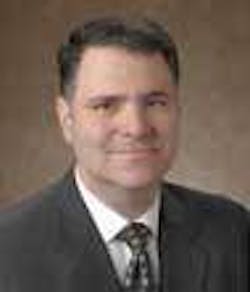Coherent CEO speaks out on blocked acquisition
Hassaun A. Jones-Bey
Coherent (Santa Clara, CA) President and CEO John Ambroseo used the occasion of the company’s fourth quarter fiscal 2006 conference call on Nov. 1 to speak out strongly about the decision of the German Federal Cartel Office (FCO; Bonn, Germany) less than a week earlier to block the proposed Coherent acquisition of Excel Technology (East Setauket, NY). During that same conference call, an Excel announcement hit the business wires, reporting that the merger agreement had been terminated.
“There are many extraordinary aspects to this case,” Ambroseo said. “First and foremost, it is distressing that the FCO has subordinated the primacy of the U.S. Department of Justice in a combination of U.S. firms, especially when the U.S. represents the largest revenue base for the combined entity. It is not clear if this is an isolated incident or if it represents a change in posture on the part of the FCO.”
Originally proposed in February and expected to close in the third fiscal quarter ending July 1, 2006, the purchase would have cost Coherent $376 million in cash. Stated purposes included combining Excel Technology’s system expertise in key product areas with Coherent’s global distribution network, aimed at pursuing industry growth opportunities related to materials processing.
The boards of both companies approved the acquisition, and U.S. Department of Justice approval was announced in May. But in July the FCO notified Coherent that it had decided to extend its investigation into the acquisition of Excel, relating to certain low-power CO2 laser products. Despite the fact that the merger was between two U.S. firms, FCO approval was required because Coherent is also one of the largest employers in the German photonics industry. Ambroseo described the process that ensued as, “perhaps more disturbing” than the ultimate decision to block the merger.
The investigation was focused on low-power CO2 lasers, and the FCO received input from 22 customers, all but two of which were located within Germany, Ambroseo said. “Of those surveyed, 17 were supportive to neutral on the transaction and five expressed concerns. One of the opposing parties had mistaken Coherent for one of our German competitors since the customer identified products that were not part of our portfolio.” He described the four remaining dissenting customers as predominantly providers of cutting and engraving equipment that accounted for less than $10,000 in combined annual CO2sales for Coherent and Excel, compared to combined annual revenues of Coherent and Excel in excess of $700,000.
“The numbers only tell part of the story,” he continued. “The FCO concluded that there was no difference between Excel’s continuous-wave and Coherent’s pulsed CO2technology, thereby allowing them to aggregate the CO2sales of the parties. This was done despite customers and technical experts telling the FCO that the technologies were not interchangeable due to process requirements.”
Ambroseo went on to characterize the FCO treatment of vertically integrated manufacturers as “similarly astounding.”
“The FCO held that vertically integrated suppliers (our customers’ competitors) did not influence pricing for CO2lasers,” he said. “They also ignored sales of CO2 lasers incorporated into an end-user system by vertically integrated vendors. This allowed them to conclude that one of our German rivals sold less than $10,000 per year in sealed CO2 lasers. You can imagine the impact that this had on market-share projections.” The FCO also stated that there is very limited substitutability between CO2lasers and other technologies, “even though they were provided ample evidence to the contrary, including the SEC filings of competitors,” he said.
Despite such concerns, Coherent chose “pragmatism over conflict” and proposed numerous remedies including divestiture of product lines, all of which were declined by the FCO, Ambroseo said. Coherent is considering appealing the FCO’s findings in German courts. Even with the termination of the merger agreement by Excel, an appeal might be appropriate as a way of protecting Coherent’s “longer-term interests,” Ambroseo said.
During a question and answer session after his prepared comments, Ambroseo noted the relatively high percentage of FCO prohibitions that go on to appeal, as well as what may prove to be a relatively high level of reversed decisions. Of the FCO’s 36 most recent prohibition orders, 24 have been appealed, he said. Six of the 24 appealing parties have won their cases, and about a dozen are still pending.
The Coherent conference call began at 1:30 p.m. Pacific Standard Time and the question and answer session was still in progress at 2:08 p.m. when the Excel termination of the merger agreement appeared on the business wire. The termination came as a consequence of the FCO prohibition order, which led to a failure to consummate the merger by the Oct. 31 date stipulated in the merger agreement.
“The management and employees have been exceptional during the last several months under difficult conditions,” said Antoine Dominic, CEO of Excel Technology, in the announcement. “They have maintained their commitment, focus and professionalism in continuing to build Excel as evidenced by our achievements during this period. We believe that the company has a strong foundation and look forward to continuing its growth pattern.”
Ambroseo said the termination of the merger by Excel would not rule out an appeal, and characterized the termination by Excel as “the prudent thing to do” and a “practical business decision,” particularly since the appeals process, if pursued, would take at least an additional 18 months from start to finish.
Asked whether Coherent has a “plan B” for continued growth in light of the blocked acquisition, Ambroseo emphasized that the company had not slackened its evolutionary process of continually improving various aspects of operations, even while the merger process was going on, and that the company will continue to pursue growth through acquisitions. There is no shortage of opportunities for growth through acquisition, he said. The key, he added, is in finding the right opportunities and the right circumstances.

